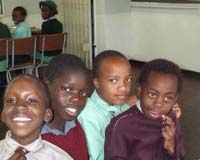
Marondera High School, Zimbabwe — Anti-AIDS Club
REDMOND, Wash., Jan. 28, 2002 — Of all the potential uses for technology, preparing youth to understand their environment and take control of their future is one of the most fulfilling — yet challenging — missions. One way to unleash technology’s power is through improved access to innovative learning tools and adequate training programs that maximize the benefits of new information and communications technologies. To that end, Microsoft and World Links have teamed to offer youth in 10 African countries an opportunity to participate in an unusual and compelling tele-collaborative project about HIV/AIDS.
“We are all used to the idea that technology can improve business productivity or open new marketing opportunities,” says Bruce Brooks, director of Microsoft Community Affairs. “But I am continually amazed at the number of ways that technology can improve the lives of all people, including those in developing countries. World Links use of technology to educate people in Africa about AIDS is truly inspiring.”
World Links is a pioneer in school connectivity and training programs in Africa, Latin America, Asia and the Middle East. Recently endorsed by the World Economic Forum’s Global Digital Divide Task Force as the leading educational organization bridging the digital divide, World Links established the first school Internet connectivity and teacher-training programs in Uganda, Zimbabwe, Senegal, Burkina Faso, Mauritania, Ghana, Mozambique and the Republic of Gambia, and has helped such programs grow in South Africa and Botswana. World Links’ objective is to prepare youth in developing countries to enter the global knowledge economy by providing technology, Internet access, extensive teacher professional development and a range of Internet-based learning projects, such as a recent example regarding HIV/AIDS, with 25,000 participating students.
In July 2001, Microsoft donated more than US$1 million worth of software, including Encarta, Front Page, Windows and Office, to more than 250 schools supported by World Links in Africa. Using this software, African secondary students have begun to learn about HIV/AIDS, sharing with peers their knowledge, ideas and action plans to reduce its spread.

Children in a Computer Lab in Uganda
“We have learned a lot from this project — such that it is wise of us as students to practice abstinence and avoid premarital sex,” one participating student, a high-school senior from Accra Academy in Ghana, told World Links officials. “We have also learned to show love and attention to AIDS patients. We also should stop AIDS and love life because AIDS is real. Therefore, we have decided to concentrate on our books and also to advise, communicate and educate others about the deadly disease AIDS.”
The six-month project includes in-depth study of the human immune system (biology), assessment of where the HIV/AIDS pandemic is most serious (geography), analysis of its devastating economic and social impact (mathematics), and discussion of the cultural dimensions of HIV/AIDS (impact on art, literature and music). Students use Microsoft software to carry out research on the Internet, prepare reports and graphs, conduct online interviews, and build Web pages to present their findings to their fellow students across Africa.
Students also venture outside their communities to interview authorities. A Namilyango College student in Uganda commented about her class’ field trip: “We really liked the field visit that we made to various places, finding more about the opinions of other people on HIV/AIDS … moving to places we had never gone to before, like entering a traditional shrine … interviewing elders and challenging them … being asked our opinion on the struggle [against AIDS] by our elders. We learned more about HIV/AIDS, namely statistical data and prevention measures. We realized that the traditional healers have changed their attitude towards HIV/AIDS and few claim to cure it. Traditional healers are working hand in hand with the modern medical practitioners and reading more. HIV/AIDS is a war that we must fight as a team.”
Aside from the academic dimensions of the project, the HIV/AIDS project is also achieving an unanticipated impact: Being able to help shape social consciousness about HIV/AIDS.
“The most important message should be that we should challenge and fight this pandemic relentlessly,” says Ama Ababio, a Zimbabwean teacher. “We should be as fearless as Chantika Nkhoma, who said, ‘I have no fear. I live with a killer already.’ Infected or affected, we all have a responsibility to play our part in eradicating this scourge.”
Twenty-two countries and 850 schools participate in World Links, which is committed to bridging the global digital divide, focusing on youth, by implementing and sustaining innovative educational technology solutions adapted to the developing world.
Microsoft International Community Affairs
Microsoft International Community Affairs (ICA) programs focus on improving the quality of life for people in countries and communities where Microsoft employees live and do business. Working through local Microsoft subsidiaries, ICA supports community programs primarily through indigenous nonprofit and community organizations. These efforts are not the complete solution to the global digital divide problem, but rather serve as catalysts for positive change for individuals, communities and countries. In the 2001 fiscal year, Microsoft contributed US$20 million ($7 million in cash and approximately $13 million in Microsoft software) to fund 105 projects in 54 countries.




